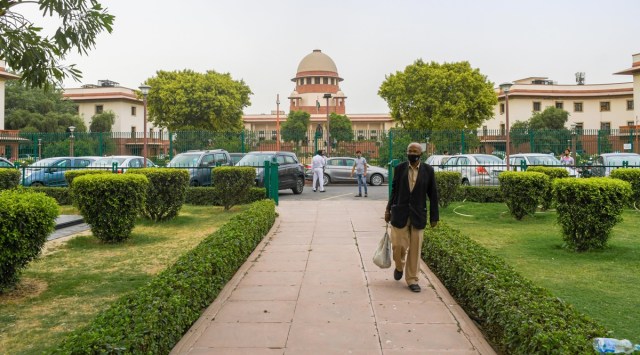THE SUPREME Court on Monday declined permission to a married woman to terminate her over 26-week pregnancy, saying the AIIMS medical board had found “no substantial foetal abnormalities” and a pre-term delivery carried the risk of being born with physical and mental deformities.
The bench, headed by Chief Justice of India D Y Chandrachud, pointed out that the pregnancy had crossed 24 weeks — the upper limit for allowing Medical Termination of Pregnancy (MTP).

“(The foetus) having crossed the statutory limit of 24 weeks, the requirements either in Section 3(2)(b) or Section 5 must be met,” it said. As per these provisions, MTP in case of a foetus exceeding 24 weeks can only be allowed if it is necessary for saving the life of the mother or if the foetus suffers from physical or mental abnormalities. The bench said the medical reports don’t “indicate that a termination is immediately necessary”.
Story continues below this ad
The woman, a mother of two, had approached the court stating that she was suffering from lactational amenorrhea and depression and was, therefore, unwilling to continue with the pregnancy.
On October 9, a two-judge all-woman bench had allowed her to terminate the pregnancy. However, two days later, one of the judges changed her mind after the All India Institute of Medical Sciences (AIIMS), where the woman was to undergo the MTP, sought clarification on how it should proceed, pointing out that the foetus appeared to be “viable”, indicating a “strong possibility of survival”. The matter was then placed before a three-judge bench.
Hearing the petition on October 13, the three-judge bench headed by the CJI noted that the woman’s medical prescriptions were “silent” on what her exact ailment was, and asked AIIMS to submit a fresh report on the condition of the petitioner and the foetus.
Perusing the fresh AIIMS reports, the bench, also comprising Justices J B Pardiwala and Manoj Misra, noted on Monday that “the length of the pregnancy has crossed 24 weeks… It is now approximately 26 weeks and 5 days” and “there are no substantial foetal abnormalities diagnosed by the medical board.”
Pronouncing its order in the post-lunch session, the bench referred to an October 10 email from AIIMS, and said “one of the options” flagged in the communication was “to direct the doctors to stop the heartbeat (of the foetus)”.
Story continues below this ad
“This court is averse to issuing a direction of this nature for the reasons recorded… The petitioner too did not wish for this court to issue such a direction. This was communicated by her to the court during the course of the hearing. In the absence of a direction to stop the heartbeat, the viable foetus would be faced with a significant risk of lifelong, physical and mental disability. The reports submitted by the medical board speak for themselves. For these reasons, we do not accede to the prayer for medical termination of the pregnancy. The delivery would be conducted by AIIMS at the appropriate time,” it said.
“The Union government has submitted, through the submission of the Additional Solicitor General, that they shall ensure that this process takes place at the earliest and in a smooth fashion. Needless to say, the decision whether to give the child up for adoption is entirely that of the parents,” the bench said.
The bench said that as per the second AIIMS report, the woman was suffering from postpartum psychosis, for which she was taking medicines. The medication, however, had no adverse effect on the foetus, the report said.
Appearing for the petitioner, Advocate Amit Mishra submitted that AIIMS had also said that an ultrasound scan cannot detect all foetal abnormalities.
Story continues below this ad
“What they put out is a reservation which any doctor will place. No doctor can give you a guarantee of a diagnosis… Sometimes, to actually ascertain complete abnormality would be a very invasive test… There may be many things which are not in the interest of the mother or the child,” the CJI said.
“This is no more a case of pro-choice or pro-life. It is really a Hobson’s choice. The choice is between a pre-term delivery and a normal delivery; pre-term delivery which will seriously compromise the physical and mental well-being of the baby, and a normal delivery which will give the baby a fighting chance for survival,” Additional Solicitor General Aishwarya Bhati said.
Senior Advocate Colin Gonsalves, appearing for an intervenor, said international law on the subject has evolved and the foetus has no unborn child rights. “Foetus is not a person, international law accepts it today,” he submitted.
However, the CJI, said: “Since you are talking of international law, you know what has happened in the US. Following Roe Vs Wade… It’s not that India is regressive… Very easy to criticise our own country, but look at what happened in the US, the way Roe Vs Wade is now substantially diluted”.








